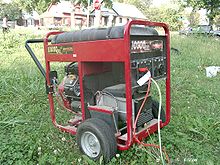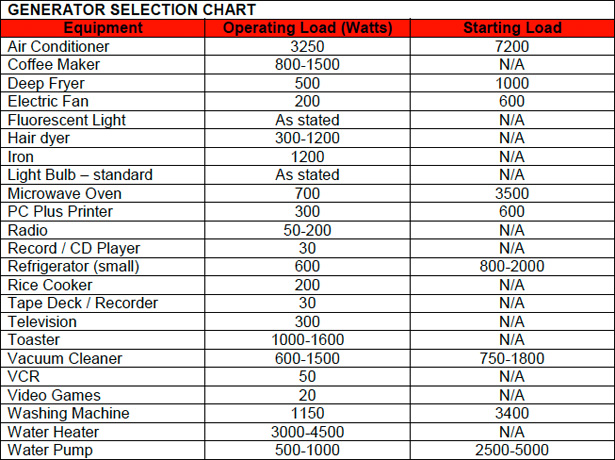
To go with the last article Off grid fuels, here is a look at using portable generators for emergency power. I know I had some misconceptions about generators. Maybe this can clear up some you might have as well.
Price
A portable generator is one of the most economical ways to provide electricity in a power outage. It’s true they can be expensive and the more you spend the more power you’ll have and the quieter it might be. If you’re selective about what you use it for, you can spend as little as a few hundred dollars. This would be great if you just want to run it for an hour in the morning and evening to keep the freezer cold.
Fuel Types
I mentioned in Off grid fuels that I chose propane as one of the fuels I store. There are generators that are available off the shelf that will use propane and there are companies that will make after-market modifications to permit its use as well. I have read that a generator will go through more propane than gasoline in an hour. If this is true, I can store a large propane tank that doesn’t need to be rotated as it doesn’t go bad; the same can’t be said for gas. I have also read that propane runs quieter. I don’t know if this is true. I was able to find a company that will take the new carburetor and modify it to use gasoline, propane or natural gas. There are kits to do this, but that’s a bit out of my depth.
Noise
Noise is a factor that many people don’t take into consideration and is often a later complaint. I have read how some people will take the generator to the edge of their property line and run extension cords back to the house, just to limit the noise. Honda generators boast some of the lowest decibel ratings on the market, but Honda’s can be expensive. Review Portable Generators reviews many different generators and they look at noise as one of the factors.
Security
If your neighbors can hear your generator, you may be asked to help keep their food cold. If Joe Dirtbag can hear that you have a generator, he might try to make off with it. If you have it away from the house, chaining it down might be a good idea, if for no other reason than to slow Mr. Dirtbag down.
Wattage Calculator
Review Portable Generators has a decent Watt Calculatorbut here is a sample one. There are some items such as a refrigerator, freezer or washer that require more power at start up and require less as it runs.
You might not be able to power everything in your home at one time, but a generator of even 2000-3000 watts can simultaneously power multiple smaller electronics such as a TV, DVD player and microwave for popcorn. Or it could power one or two larger items such as a washer or dryer.
If your main goal is to keep food in the fridge or freezer from going bad, you don’t need to run the generator 24/7. A couple of hours in the morning and evening should suffice. Also, the fuller the fridge and freezer are, the longer they’ll take to thaw out. You can take up empty space with 2-liter bottles of water.
Connecting to Your Home
There are two ways to do this, either run extension cords from the generator to your appliances, or with a power transfer switch. To connect a generator directly to your home you’ll need to have an electrician install a power transfer switch (As can be seen below). This will allow you to connect the generator to the power transfer switch and then select which breakers you want powered. This will also prevent you sending power back down the line, which could harm a utility worker.
Final Thoughts
You’ll also want to store oil and filters so that you can do maintenance as needed. I was asked once about whether or not a person should start their generator or just leave it new in the box. My answer was that if you leave it in the box, you won’t know if it works and you won’t know how to use it. If you take it out of the box then you’ll need to run it once or twice a year to exercise it and make sure it runs and you’ll also need to do maintenance on it.
Generator Joe is one resource that you can use to delve deeper into the subject, there is a huge amount of information under the resource and Information tabs at the top.
Please click here to vote for Prepared Christian as a top Prepper site!
If you liked this article please think about sharing it on the social media listed below, thanks!





